1997 Industrial Hwy, York, PA 17402
Our Doctors

Dr. Valerie Miller – Hospital Founder & Administrator



Dr. Tracy Moussa – Associate Vet
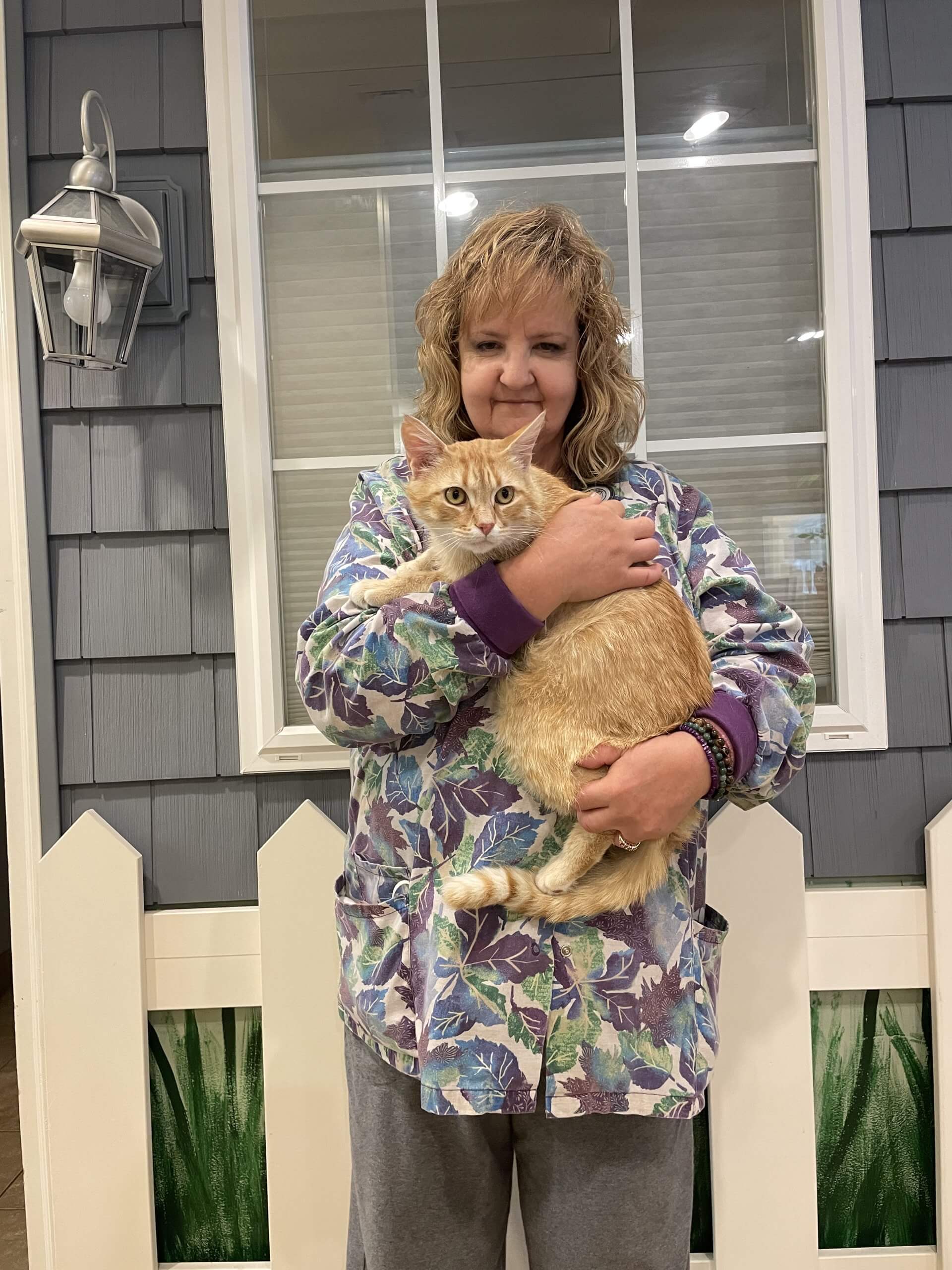


Dr. Erika Rossi – Associate Veterinarian
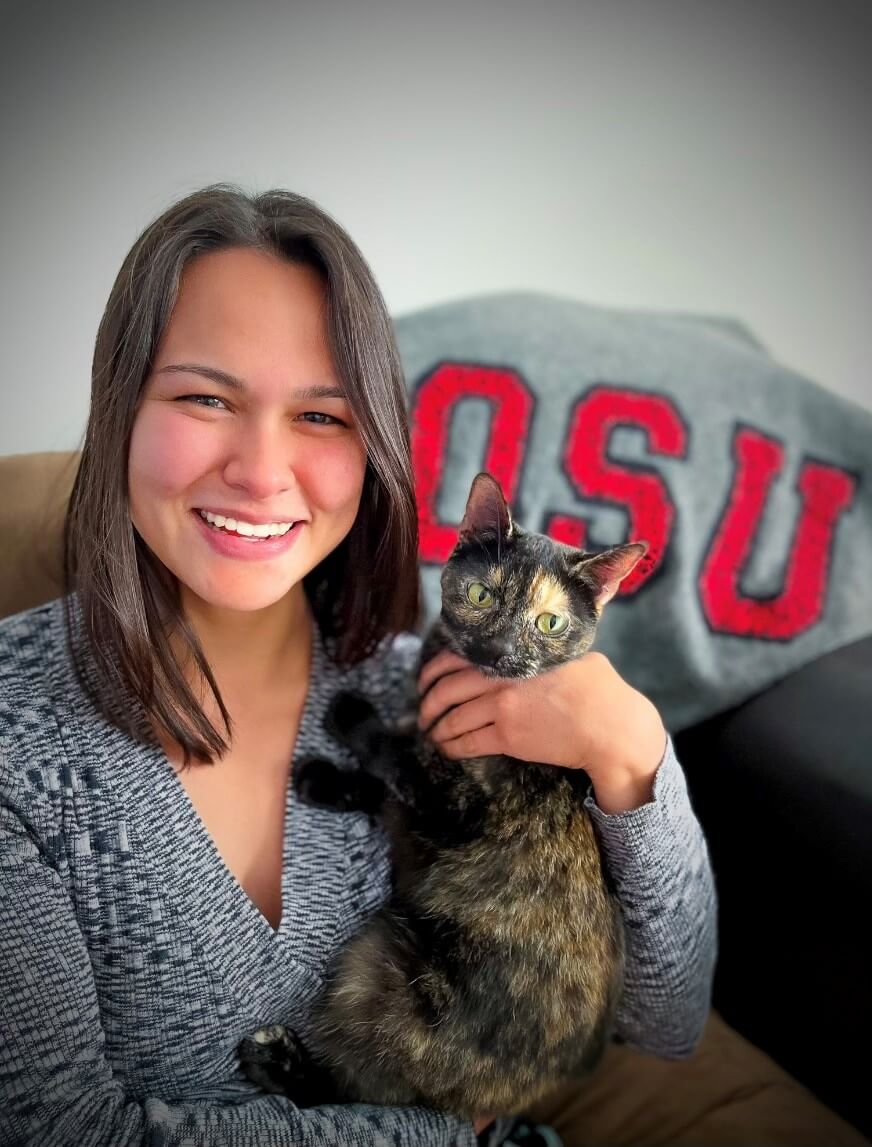


Dr. Alyssa Nelson – Associate Veterinarian



Dr. Shelby Ziegler



Dr. Kurt Michelotti – Associate Veterinarian
Our Services
- Behavior
- Dental Care
- Laser Therapy
- Educational Opportunities
- Surgery
- Microchipping
- In-House Laboratory
- Internal Medicine
- Vaccinations
- Senior Wellness
- Preventative Care
- Imaging
- End of Life Care
- Avian Care
- Pocket Pets
- Reptiles
East York Veterinary Center offers basic obedience training and behavior modification programs. Behaviors we typically manage include:
DOGS:
- aggression
- inappropriate urination
- separation anxiety
- generalized anxiety/fear
- basic puppy issues – jumping, nipping, etc.
- socialization
- introduction of new pets
- over excitability
CATS:
- aggression
- inappropriate urination
- generalized anxiety
- scratching
- socialization
- introduction of new pets
Please call 717-840-1025 for questions, pricing and scheduling a consultation.
Oral health is an essential part of your pet’s overall care. Dental disease is painful and can lead to bacteria spreading to your pet’s heart, liver and kidneys. The most important thing you can do is start brushing your pet’s teeth at an early age.
Signs of dental disease are not limited to dirty teeth. Even if your pet’s teeth look normal, dental disease can be eating away at his/her roots. Often the first sign will be bad breath with or without discoloration.
With each preventative care exam, we thoroughly examine your pet’s mouth, teeth and gums. If there is disease present, it is important to have the teeth and gums cleaned under anesthesia and a tooth-by-tooth examination performed by the veterinarian. As the majority of dental disease occurs below the gum line, it is essential to anesthetize your pet so that we can thoroughly clean and treat the disease. This also allows for dental radiographs (X-rays) to be taken. Following treatment, your veterinarian will create a plan for maintaining proper oral care.
At East York Veterinary Center, we offer free tooth brushing demonstrations and can walk you through a step by step process for getting your pet comfortable with this daily care.
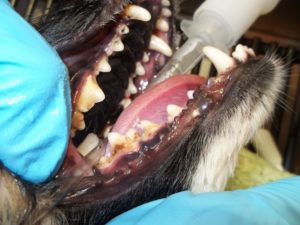

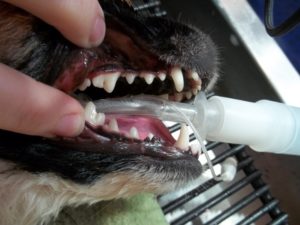

East York Veterinary Center is excited to offer laser therapy for patients! Laser therapy is a non-invasive, drug-free treatment that can be helpful in many settings because it promotes healing, decreases inflammation, and controls pain.
A therapeutic laser (sometimes called a “cold” laser) works by delivering energy in the form of non-visible laser light directly into affected tissues. This increases local blood flow and stimulates activity at the cellular level, which speeds up the body’s normal healing processes and resolves unwanted inflammation. Other actions, such as local endorphin release and reduction of chemical signals associated with pain, also make laser therapy an effective and low-risk tool in the management of pain.
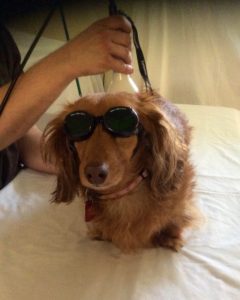

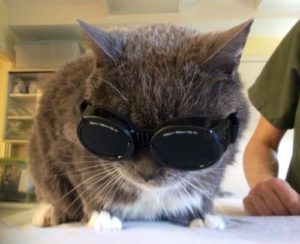

Laser therapy is a diverse treatment tool. At East York Veterinary Center, we see a multitude of species, from dogs and cats to small mammals, birds, and lizards, and therapeutic laser treatments can be tailored to all of them. Additionally, there are many acute and chronic conditions that respond to laser therapy, including:
- Allergic Dermatitis
- Anal Gland Disease
- Arthritis
- Back & Neck Pain
- Burns
- Cystitis
- Ear Infections
- Feline Acne
- Fractures
- Gingivitis, Stomatitis, & Periodontal Diesease
- Hip Dysplasia
- “Hot Spots”
- Infections & Inflammation
- Lacerations
- Post-Surgical Wounds & Pain
- Sprains, Strains, & Tendonitis
- Other Traumatic Wounds
Laser treatments are simple and are crafted individually for each pet. The energy dosage is calculated based on the characteristics of the patient and the nature and location of the problem; an arthritic hip in a big dog will need more laser energy than a sore on the toe of a little cat. Our state-of-the-art machine will use these parameters to automatically generate treatment protocols and save them for each patient and each problem, ensuring consistency and accuracy. The laser energy is delivered through a hand-held wand that is placed directly onto or held right above the treatment area. After applying the laser for a set amount of time, your pet’s treatment is finished and he or she is on the way to feeling better!
East York Veterinary Center provides externships for veterinary medical and veterinary technician students. We also provide educational opportunities for younger students and other interested groups. For more information, please contact our practice manager at practice.manager@eastyorkvet.com.
At East York Veterinary Center, we have a dedicated surgical suite with two anesthetic machines, electrocardiography, blood pressure, and respiratory monitoring. An experienced technician will monitor your animal’s condition under anesthesia while a skilled veterinarian is performing the procedure.
Before Surgery:
- Do not feed your pet after 10 pm the night before to reduce surgical complications.
- Do not give any medications that morning unless instructed by your veterinarian, and always inform the staff of any supplements, vitamins, or other OTC products your pet is receiving.
- On the morning of surgery, a skilled veterinary technician will record all necessary information for you and your pet, answer any questions you may have, and obtain an emergency contact number so that we may keep you informed of your pet’s progress throughout the day.
The Day of Surgery:
- All pets receive a thorough physical examination by our veterinarians on the day of the procedure and will have pre-anesthetic blood work performed to make sure your pet is in good health prior to anesthesia.
- Surgical patients (except feline neuter patients) have an intravenous catheter placed and are put on intravenous fluids during and/or after surgery.
- A dedicated technician will monitor your pet under anesthesia and post-anesthesia to ensure a smooth and safe recovery.
- A member of our staff will update you throughout the day on your pet’s progress. The majority of patients can go home that evening, depending on the degree of illness.
Our veterinarians are skilled in, but not limited to, performing the following surgeries:
- Ovariohysterectomy (spay)
- Castrations (neuter)
- Mass removals
- Cystotomy (bladder surgery)
- Abdominal exploratory surgery (foreign bodies, splenectomies, liver biopsies)
- Advanced soft tissue surgery such as perineal urethrostomies
- Orthopedic surgery by a traveling orthopedic surgeon such as cranial cruciate ligament repairs and fracture repairs
If at any point you have any questions regarding your pet’s surgical care or a planned procedure please do not hesitate to call us at 717-840-1025 and speak to a member of our staff.
We encourage all pet owners to microchip their animal companions. The sad fact is that only 17% of dogs and 2% of cats make it back to their owners when they become lost. Microchipping greatly increases the chances that your pet will be returned to you.
Microchipping a pet is simple, relatively painless and very affordable. Unlike collars and tags, microchips can’t fall off and they serve as permanent identification for a pet’s entire life.
Ask about microchipping your pet at your next visit or give us a call at 717-840-1025.


East York Veterinary Center has the capability to perform various blood tests, pre-anesthetic bloodwork, and other types of testing on site instead of sending samples to an outside lab. This saves time, money, and most importantly, you don’t have to wait overnight for results—meaning your pet gets a diagnosis and needed treatment sooner.
Testing provided in the hospital includes:
Chemistry Panels:
- Liver enzyme screening
- Pancreatic evaluation
- Renal (Kidney) profiles
Wellness screenings:
- Complete blood counts
- General chemistries
- Blood gases
- Urinalysis
- Fecal testing (parasites)
- Blood pressure
Viral screenings:
- FelV, FIV in cats
- Parvovirus in dogs
While we do offer an extensive range of on-site testing, it is possible that your pet may need laboratory work beyond our scope. For those cases, we are happy to send blood work or other testing to an outside lab that will send results back to us.
For more information on our in-house lab services or to schedule your pet for testing, call us at 717-840-1025.
Here at East York Veterinary Center, our doctors are skilled in diagnosing and treating many diseases that your pet may encounter in his or her lifetime. Early diagnosis gives your animal companion a better chance of fighting the disease or illness, and often a better prognosis.
To make a diagnosis as efficient and accurate as possible, we offer digital radiography, electrocardiography, blood pressure testing and an in-house laboratory.
Our in-house lab includes:
- Complete blood count analysis
- Chemistry screening
- Thyroid testing
- Feline leukemia and feline AIDS screening
- Urinalysis
- Heartworm and tick disease screening
- Clotting profiles
Our doctors work together on each case, and this collaborative approach truly benefits your pets as it allows for multiple points of insight into an animal's condition and also makes for efficient continuity of care.
Vaccinating your pet is a relatively inexpensive but very important way to protect his or her health. In addition to preventing many life-threatening illnesses, vaccinations can prevent diseases prevalent in wildlife and those that can be passed to humans. It's important to administer a full vaccination series when pets are puppies and kittens because their young immune systems are still developing and need protection to stay healthy.
While any medical treatment involves some degree of risk, in the case of vaccinations, the benefits far outweigh any potential side effects. Adverse reactions are rare and usually mild and short-term when they do occur.
Which vaccines should your pet have? “Core” vaccines are those recommended—and possibly mandated by law—for most pets. Core vaccines include:
- Rabies (dogs and cats)
- DA2PPV - Distemper, Hepatitis, Adenovirus 2, Parvo and Parainfluenza (dogs)
- FVRCP - Feline Viral Rhinotracheitis, Calicivirus and Panleukopenia (cats)
Other non-core, but highly suggested vaccinations for cats include FIV for feline immunodeficiency virus and FeLV to protect against feline leukemia. For dogs, bordetella and canine influenza shots are recommended if they frequent dog parks, boarding kennels, or any place where they’re socializing with other canines.
It’s also important to note that even pets who live primarily indoors should be vaccinated, as they can still be exposed to a
As we all know too well, our pets (unfortunately) age faster than we do and that's why it is so important to monitor the internal, as well as external, changes that occur as they get older.
We offer senior exams and testing to allow for early detection and treatment of disease so we can maintain health and prevent illness during your pet’s senior years. Catching health issues early often gives us more effective and less costly treatment options. In addition, senior wellness care helps establish normal baseline values for your pet, creating a point of comparison for the future.
While your pet may seem healthy well into their senior years, many problems common to elder pets may not present symptoms until your animal companion becomes seriously ill.
The veterinarians at East York Veterinary Center recommend senior testing for all pets at the age of seven years old, and then annually. A comprehensive senior care program includes:
- Biannual physical examinations
- Complete blood count
- Complete chemistry screen
- Thyroid screening
- Urinalysis
- Blood pressure monitoring
- Radiographs of the chest and abdomen
If you have any questions regarding how a comprehensive senior program can help your pet stay healthy for as many years as possible, just give us a call at 717-840-1025.
Early detection and treatment of disease is essential to maintaining your pet’s health and preventing serious illnesses. This is why at East York Veterinary Center all pets receive a thorough physical examination at each and every visit, including vaccination appointments. As part of your pet’s healthcare, the veterinarians at East York Veterinary Center perform a multitude of services at each visit.
Annual and biannual exams
Even from a young age, it is your pet’s nature to perfect the art of hiding illness. It is only through a physical examination that we are able to identify the subtle cues indicative of the beginning of a disease process. As animals have different requirements at each life stage, it is important to examine them at least annually.
Annual parasite testing
Did you know that certain intestinal parasites are transmitted to people? By checking annual stool samples, we can protect both you and your pet from harmful parasites.
Annual heartworm and tick-borne disease testing
Due to animals being transported across the country, incidences of heartworm disease have been increasing. Therefore, annual testing is very important even if your pet is on monthly heartworm preventative.
Dental care
Dental disease can cause not only primary problems, but the bacteria in the mouth can travel to other organs including the heart, liver and kidneys. Therefore, an oral exam and proper dental care are key to your pet’s well being.
Flea/tick and heartworm preventative
Monthly preventatives are an essential part of caring for your beloved pet. It takes 48 hours (or less) for ticks to transmit disease, so if you can prevent attachment, you will drastically reduce your pet’s risk of contracting serious infections. Heartworm preventatives protect against deadly heartworm disease and intestinal parasites. If your pet misses more than two months of heartworm preventative, he/she must be tested before resuming treatment.
Vaccinations
These play a critical role in keeping your pet happy and healthy by limiting and/or eliminating deadly diseases. As viruses can come in on your body or clothing, even indoor-only pets are at risk. Depending on your pet’s lifestyle, your veterinarian can determine the appropriate vaccinations that may be required.
Have questions about preventative care for your pet or want to make an appointment? Call us at 717-840-1025.
Digital Radiography
Using advanced digital radiography (X-rays), the veterinarians at East York Veterinary Center are able to visualize your pet’s internal organs with improved detail. This technology allows us to be able to manipulate the image for improved contrast and zoom in on areas of interest which reduces the need for prolonged or repeated exposure to radiation.
Off-site Ultrasonography
Our doctors work closely with multiple specialists including an ultrasonographer. If your pet needs an abdominal ultrasound or an echocardiogram (to evaluate the heart) we can refer you to a nearby specialty facility for this test. Once the test is performed, we can determine the appropriate treatment and continue your pet’s care here, at East York Veterinary Center.
Digital Dental Radiography
The majority of pets’ dental disease occurs below the gum line. As animals cannot tell us where it hurts, radiographs of your pet’s teeth give very useful information regarding the health of the tooth. With digital radiographs, we can manipulate the image for improved contrast and zoom in on areas of interest, decreasing the need for prolonged or repeated exposure to radiation and reducing the time your pet is under anesthesia.
Have questions about imaging services for your pet? Give us a call at 717-840-1025.
All of us face the day when we have to say goodbye to our furry loved ones. At East York Veterinary Center, we are dedicated to helping and supporting you through this difficult experience. The following is a list of the end-of-life services* we offer at East York Veterinary Center:
- Comfort room
- Outdoor euthanasia area
- Private exit
- Grieving packet with support information
- Clay pawprint and locket of fur
- Memorial donation to SPCA
- Feather shadow box
- Pictures on Pet Angel Page of our website
- Availability of urns and other pet memorial items
- Outdoor euthanasia area
*Contact us for pricing of these services.
If you are struggling with determining your pet’s quality of life or with making the choice to end suffering, please do not hesitate to call and speak to one of our compassionate staff members. We are here to help.
Birds make wonderful, fascinating companions—but they do require consistent care to keep them happy and healthy.
The single most important thing you can do to maintain your avian friend’s health is to make sure you keep up with regular veterinary exams. While twice per year is optimal, at a minimum they should see the veterinarian annually to:
- check body condition and weight
- inspect skin and feathering
- examine eyes, ears, nose, and throat
- palpate the abdomen
- listen to heart, lungs, and air sacs
- discuss diet and socialization
- test alertness
We may also recommend routine testing for parasites, inflammation, bacterial infections, anemia, nutritional health, immune system function, and disease.
Birds are fragile and very good at hiding signs of illness or injury. Don’t let them fool you! If your bird exhibits any visible signs of illness, please call us right away—it is likely an emergency for your bird. It’s very common for the first signs of avian illness to go unnoticed, so it is important bird owners know what look for and we can help you with that.
Please give us a call today to set up a wellness appointment for your feathered pet or call us at 717-840-1025 if you have any concerns that your bird may be ill.
East YorkVeterinary Center knows that best friends come in all shapes and sizes and that’s why in addition to dogs and cats, we provide comprehensive care for rabbits and other small mammals or “pocket pets”, including:
- Guinea Pigs
- Hamsters
- Gerbils
- Ferrets
- Sugar Gliders
- Rats
- Mice
Many of these animals do require a very particular environment to thrive, and it’s important you have a veterinarian experienced in their care to help. Our doctors can advise you about proper care, feeding and maintenance of your pet, as well as treat illnesses and conditions specific to their species.
Need to bring your out-of-the-ordinary companion to see us? Give us a call at 717-840-1025.
Reptile Care at East York Veterinary Center
At East York Veterinary Center, we don't limit our expertise to just cats and dogs. We also offer quality veterinary services for your reptile friends! Whether scheduling your pet's next wellness & preventative exam or stopping in for a sick visit, we are here to help!
Specialized Exotic Pet Care
Our trained veterinarians are well-versed in the unique healthcare needs of reptiles. We offer a range of medical and surgical services* designed to provide the best possible care for your special pet.
Schedule an appointment today to provide your reptile with the top-rate reptile care that they deserve.
*Our services exclude venomous species.
We understand that a pet is part of the family. The day your pet enters our hospital it becomes part of our family, too—and our goal is to give them as many happy, healthy years with you as possible. From new puppies and kittens to graying seniors, we’ll be there every step of the way with comprehensive services and the experienced, compassionate care your pets deserve.